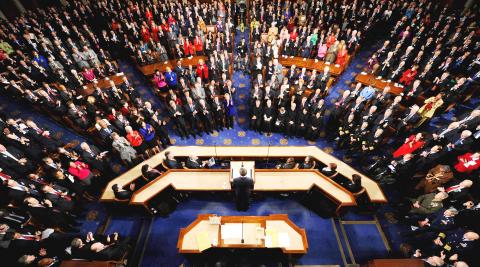US President Barack Obama gave Americans a sign of how he’ll lead the country in the run up to next year’s election, as he used his State of the Union address to stake out ground in the political center and call on Republicans and Democrats to work together to revive the US economy.
The nationally televised speech on Tuesday night was Obama’s first appearance before Congress since opposition Republicans took control of the House of Representatives earlier this month. It marked the midpoint of his presidential term, as he rebounds from the Democrats’ electoral defeat in November. The speech also came as he begins positioning himself for next year’s re-election campaign.
Obama kept the focus on the economy, calling for both parties to unite behind his program of cuts and spending, saying: “We will move forward together or not at all.”

PHOTO: AFP
He proposed no major initiatives comparable to the health care overhaul that dominated the first two years of his presidency, instead outlining an agenda aimed at both ends of the political spectrum.
For Democrats, he defended his health care plan, opposed privatization of the Social Security pension program and called for ending tax cuts for the rich. He also proposed a burst of spending on education, research, technology and transportation to make the US more competitive with emerging economic powers like China and India.
However, Obama also backed some top priorities of Republicans. He called for freezing some federal spending, cutting the corporate tax rate, shaking up the federal government and eliminating lawmakers’ pet projects.
Though Obama won some cheers from Republicans, they remain dissatisfied with his efforts to cut the deficit, their core issue.
House Budget Committee Chairman Paul Ryan, giving the official Republican response, said the US was at “a tipping point” leading to a dire future if federal deficits aren’t trimmed.
Obama spoke to a television audience in the millions and a Congress sobered by the assassination attempt against one if its own members, Gabrielle Giffords. She was seriously wounded in the shooting rampage in Tucson, Arizona, that killed six people. Her seat sat empty.
Obama entered the House chamber to prolonged applause, and to the unusual sight of Republicans and Democrats seated next to one another rather than on different sides of the center aisle, in a show of support and civility following Giffords’ shooting. And he began on a graceful note, taking a moment to congratulate John Boehner, the new Republican speaker of the House.
Calling for a new day of cooperation, Obama said: “What comes of this moment will be determined not by whether we can sit together tonight but whether we can work together tomorrow.”
In a speech with little focus on national security, Obama appeared to close the door on keeping any significant US military presence in Iraq beyond the end of the year.
“This year, our civilians will forge a lasting partnership with the Iraqi people while we finish the job of bringing our troops out of Iraq,” he said.
The president reiterated his call for a comprehensive immigration bill, although there appears little appetite for it in Congress.

OPTIMISTIC: The DGBAS sharply upgraded its GDP growth estimate from 3.54 percent to 7.71 percent after the Taiwan-US trade agreement signing and given AI optimism The US imported more from Taiwan than China for the first time in decades, as US President Donald Trump’s tariffs reshape trade flows while a global boom in artificial intelligence (AI) fuels demand for tech products. US purchases of goods from China plunged almost 44 percent in December last year from 2024 to US$21.1 billion, US Department of Commerce data showed on Thursday. By contrast, shipments from Taiwan more than doubled during the same period to US$24.7 billion. The soaring Taiwanese shipments to the US reflect the huge expansion in supplies of chips and servers for AI companies, which has completely changed

The Central Election Commission has amended election and recall regulations to require elected office candidates to provide proof that they have no Chinese citizenship, a Cabinet report said. The commission on Oct. 29 last year revised the Measures for the Permission of Family-based Residence, Long-term Residence and Settlement of People from the Mainland Area in the Taiwan Area (大陸地區人民在台灣地區依親居留長期居留或定居許可辦法), the Executive Yuan said in a report it submitted to the legislature for review. The revision requires Chinese citizens applying for permanent residency to submit notarial documents showing that they have lost their Chinese household record and have renounced — or have never

US and Chinese fighter jets briefly faced off above waters near the Korean Peninsula this week, Yonhap News agency reported, marking a rare confrontation in that area between the two superpowers. About 10 US fighter jets on Wednesday departed an airbase in Pyeongtaek, South Korea, for drills above international waters off South Korea’s western coast, the news outlet cited unidentified military sources as saying. While the US planes did not enter China’s air defense identification zone, Beijing scrambled planes as they neared that region, the report said. “The Chinese People’s Liberation Army organized naval and air forces to monitor and effectively respond

Taiwan has secured another breakthrough in fruit exports, with jujubes, dragon fruit and lychees approved for shipment to the EU, the Ministry of Agriculture said yesterday. The Animal and Plant Health Inspection Agency on Thursday received formal notification of the approval from the EU, the ministry said, adding that the decision was expected to expand Taiwanese fruit producers’ access to high-end European markets. Taiwan exported 126 tonnes of lychees last year, valued at US$1.48 million, with Japan accounting for 102 tonnes. Other export destinations included New Zealand, Hong Kong, the US and Australia, ministry data showed. Jujube exports totaled 103 tonnes, valued at